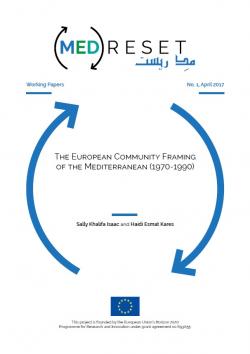The European Community Framing of the Mediterranean (1970-1990)
This paper examines the early phase of European construction of the Mediterranean during the 1970s and 1980s. It seeks to analyse how the European Community (EC) discursively constructed itself against the Mediterranean as a neighbouring space, and how it mapped the Mediterranean accordingly. It concludes that early attempts towards European construction of the Mediterranean were mainly triggered by the EC’s economic interests and necessitated by its recurring enlargement processes. The EC did not perceive the Mediterranean as a coherent region, and a clear distinction was made between its various geographical components. The analysis also shows that most of the Community’s initiatives for political cooperation with many Mediterranean countries did not succeed. It demonstrates how most Europeans perceived Middle East politics as a domain of US active diplomacy, even while the EC perceived itself as the most powerful actor capable of constructing the Mediterranean as a zone of economic prosperity.
-
Details
Roma, IAI, April 2017, 23 p. -
In:
-
Issue
Working Paper 1
Introduction
1. The Formulation of the GMP: Economics Hold the Mediterranean Basin Together vis-à-vis the EC
2. The EC’s Self-Construction in the Mediterranean: A “Civilian Power”?
3. Reframing Mediterranean Partners: The Particularity of the Middle East and the Southern Mediterranean
4. The Context of Community Enlargement in the 1980s: The Mediterranean as a Dividing Line and European Inclination towards Sub-Regional Cooperation
5. EC Securitization and De-Securitization Processes in the Mediterranean: Between Security Practices and Adoption of Ordinary Measures
Conclusion
References



